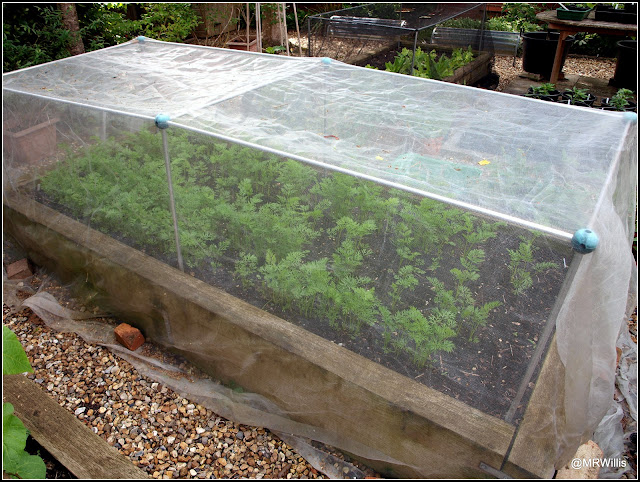I normally devote one of my raised beds to the growing of carrots, and cover it with Enviromesh to ward off the Carrot Root Fly.
That bed measures 1 metre x 2.4 metres and I usually manage to squeeze in five rows of carrots. This means I can afford to grow several different varieties - though only a few of each. If I wanted to be self-sufficient in carrots I would have to use all five of my raised beds!
I'm not attempting to be self-sufficient though. I just like to have a few really NICE carrots once in a while, instead of the great big tasteless ones from the supermarkets. This year, I sowed two rows of "Nantes" which are smallish early variety, two rows of "Autumn King" which are a big maincrop variety, and a half-row each of "James Scarlet Intermediate" (medium-size, early) and "Dragon, Purple". The latter were from seeds obtained at an informal seed-swap with some friends, and were only intended as a curiosity. If you are interested in this, I wrote about the actual sowing the carrots in an earlier post HERE.
The early (Nantes and James Scarlet Intermediate) carrots were ready to harvest by the beginning of July, though we ate the thinnings before that. I think that early carrots are best eaten either raw or plainly boiled or steamed, so that you can really enjoy their flavour and crisp fresh texture. It would be a sin to put them in a stew!
 |
| "James Scarlet Intermediate" |
The "James Scarlet Intermediate" were the better of the two varieties in terms of looks. Quite a few of the "Nantes" ones came out forked. I don't know why one variety would do that more than another, when grown in exactly the same (sandy, stone-free) soil, but it did.
The "Dragon, Purple" carrots exceeded my expectations. They had a beautiful taste as well as being very tender in texture. All this as well as a very striking appearance - although purple on the outside they are mostly orange-coloured inside, though a couple were yellow! Since we had so few of them they were all eaten raw, and before they got too big. We liked them a lot, and I plan to grow them in greater quantity next year.
Just a few days ago I pulled a few of the "Autumn King" maincrop carrots, mainly just to see what they were like, because it is hard to tell from just what you see above the soil surface. They differed a lot in size, but there were some very substantial ones in the bunch. These are the sort of carrots that will stand up to long slow cooking if you want them to.
I'll be harvesting these on an "as needed" basis over the coming weeks, since I don't need the space they currently occupy for Winter veg. Maincrop carrots will be OK in the ground in all but the severest Winter weather (though the ground around them might freeze and stop you harvesting them), but I like to pull most of mine before Christmas at the latest. I find that carrots left in cold wet soil are very vulnerable to slug damage, and it's better to lift them. Some people store carrots in boxes of damp sand, but I have never had enough to really make this worthwhile. We just keep a few ready-use ones in a plastic bag in the bottom of the fridge, and dig some more every now and then.
Another type of carrot that we really love is the finger or cocktail type - small and usually thin. They are intended for eating raw. Over the years I have tried several different varieties, but I have decided that "Amsterdam Forcing" in its many variants (numbered I, II, III etc) is my favourite. I pulled a few of them in order to photograph them for this post, and I see that they are not as long as usual, which is a shame. For finger carrots these are quite stubby.
 |
| "Amsterdam II Solo" |
Due to lack of space in the raised beds I usually grow this type in containers. This year I have two such containers. The first is simply a biggish (30cm diameter) flower-pot, though you can't see much of it present!

The other is one of the 35-litre tubs in which I grew Early potatoes.

The main thing to consider if you plan to grow carrots in containers is the fact that they put down long roots, so the container should be at least 20cm deep. Also remember that containers dry out very rapidly and need frequent watering - especially in long hot Summers like that of 2018!





Nice helpful post, as ever. That's the second endorsement for Dragon I've read today. For my part I am comparing my 5 (all orange) varieties. I've dug up a sample of each but have yet to blind test them on the family.
ReplyDeleteWe are pulling Early Market carrots at the moment as we need them. We leave our carrots in overwinter as we have never been successful at storing them lifted. We’re using lots in coleslaw as we have lots of cabbage too. Even in stews the flavour of home grown carrots shines through.
ReplyDelete